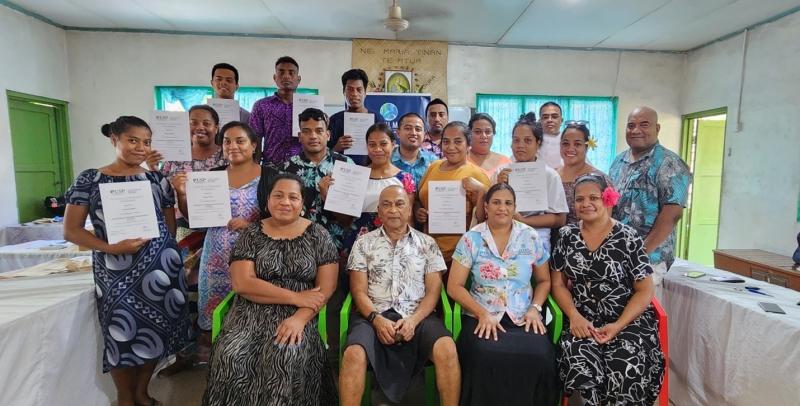
Tarawa, Kiribati – The seafood industry plays a crucial role in the Kiribati economy, providing sustenance and supporting livelihoods within Kiribati communities. To bolster the capabilities of individuals within this sector, we are thrilled to announce the completion of Kiribati’s first batch of graduates of the micro qualification training on establishing and operating a small seafood business.
“As the seafood industry continues to evolve, it's essential that professionals within the field have access to relevant and practical training," said USP PEUMP’s course developer and trainer, Shirleen Bala. "Our Micro-Qualification in Establishing and Operating a Small Seafood Business is tailored to meet these needs, equipping individuals with the knowledge and skills to thrive in this dynamic sector."
Funded by the European Union and the Government of Sweden, this small-scale seafood business is targeted at small-scale seafood businesses, entrepreneurs, market vendors, fishers and seafood sellers.
“This program will assist Kiribati nationals already in business, to operate successfully and also help potential entrepreneurs planning to establish a new business.” said Tieri Tamoa, Deputy Secretary, Kiribati Ministry of Fisheries & Marine Resource Development. “And I am also confident that our new graduates will become professionals, trainers and advocates in sustainable seafood businesses; further sharing this knowledge to communities.”
The holder of this qualification will gain knowledge and skills on the fundamentals of establishing and operating a small business, marketing for small business, developing customer driven marketing strategies, basic bookkeeping, and writing a business plan.
“Having started this my small seafood business on tuna, close to a year now, this training has helped to improve my business skills.” Koru Tebakabo, Small seafood business owner. “An important lesson I learnt was on developing business plans. And after this training, I now look forward to developing my own business plan.”
This training may be followed by other upskilling programs such as seafood safety and quality, value chain analysis, upscaling community-based management, financial literacy and leadership trainings.
USP is one of four key implementing partners of the PEUMP Programme, an initiative funded by the European Union and the Swedish government. The overall EUR 45million program promotes sustainable management and sound ocean governance for food security and economic growth while addressing climate change resilience and conservation of marine biodiversity.
It follows a comprehensive approach, integrating issues related to ocean fisheries, coastal fisheries, community development, marine conservation and capacity building under one single regional action. The PEUMP programme is housed within the Institute of Marine Resources within the School of Agriculture, Geography, Environment, Ocean and Natural Sciences (SAGEONS).
About us
The Pacific-European Union Marine Partnership (PEUMP) Programme addresses some of the most serious challenges faced by Pacific countries. Among these are the increasing depletion of coastal fisheries resources; the threats to marine biodiversity, including negative impacts of climate change and disasters; the uneven contribution of oceanic fisheries to national economic development; the need for improved education and training; and the need to mainstream a rights-based approach and to promote greater recognition of gender issues to ensure inclusiveness and positive changes for Pacific island people. The seven-year PEUMP programme is funded by the European Union (EUR 35 million) and the government of Sweden (EUR 10 million). It is implemented by the Pacific Community (SPC), the Forum Fisheries Agency (FFA), the Secretariat of the Pacific Regional Environment Programme (SPREP) and the University of the South Pacific (USP) in close collaboration with Non-Government Organisations and the national authorities.